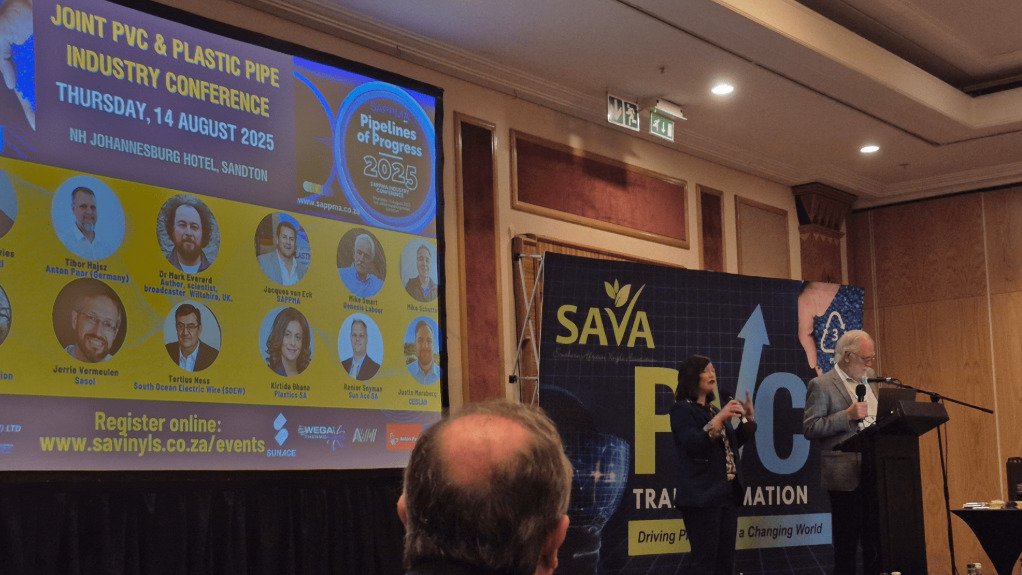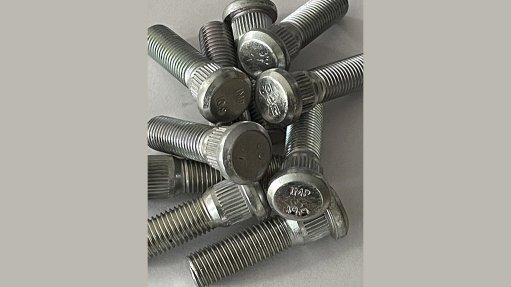Conference highlights sustainability, innovation


INDUSTRY LEADERSHIP Sasol is well-positioned as a leader in the chemicals industry and through focused industry conferences, they can present their innovations in PVC, such as polymer grades, additives, and processing techniques
The joint Southern African Vinyls Association (Sava) and Southern African Plastic Pipe Manufacturers Association (Sappma) conference featured a Sava-focused course, titled PVC Transformation: Driving Progress in a Changing World, under the central themes of innovation and sustainability. It also featured a parallel Sappma session, titled Pipelines of Progress.
The conference, held on August 14 at the NH Hotel, in Johannesburg, provided a platform for networking and discussing trends, innovations and new opportunities in the polyvinyl chloride (PVC) and plastics industries.
Key highlights included keynote speeches by University of the West of England associate Professor Mark Everard, petrochemical distribution company Vinmar International global PVC sales and sourcing head Jonathan Davies, and chemicals and energy company Sasol research and development applications development scientist Jerrie Vermeulen.
Vermeulen used his keynote to highlight the importance of Sasol’s Fischer-Tropsch waxes to improve PVC processing.
The Fischer-Tropsch wax process uses gas-to-liquids technology to convert natural gas into high-quality waxes with distinct properties such as high melting points and low viscosity.
“The core of the process is the Fischer-Tropsch synthesis, where carbon monoxide and hydrogen react over metal catalysts to produce liquid hydrocarbons, which are then processed into waxes for various industrial applications such as holt-melt adhesives, asphalt additives and plastics,” Vermeulen explained.
The technology also contributes to sustainable PVC by allowing for the production of high-performance additives, which not only require less energy and reduce waste during PVC processing but also result in increased output and higher-quality products.
Vermeulen also stressed that the potential of this process was its ability to convert nonfossil feedstocks, such as recycled CO2 and biomass, into high-value products, thereby representing a strategic shift that supports Sasol’s greenhouse-gas (GHG) emission reduction targets and allowing for new value chains in a lower carbon economy.
“These improvements support Sasol’s 2030 sustainability objectives by reducing our environmental footprint, as more efficient processes require less energy and fewer raw materials, directly translating to lower production costs and improved profitability,” Vermeulen noted.
The company is positioning itself to expand its contribution to the PVC sector through more efficient and sustainable solutions, including the promotion of its Sasolwax B52, designed to improve performance in pipe and injection- moulded fittings.
The product aims to achieve greater efficiency and sustainability in PVC applications by enhancing fusion promotion, melt viscosity reduction, metal release and lubrication.
The development of lower-carbon waxes is part of Sasol’s broader initiative to grow its portfolio of sustainable products.
Vermeulen noted that these lower-carbon waxes enabled its PVC customers to reduce their Scope 3 GHG emissions.
Sasol’s strategy also includes the longer-term vision of shifting its portfolio to sustainable products and exploring the use of green hydrogen as a feedstock for its Fischer-Tropsch process to further decarbonise its processes.
“This technology’s ability to use various feedstocks, including gas and, possibly, green hydrogen, will be key to creating a more sustainable product range,” Vermeulen concluded.
Article Enquiry
Email Article
Save Article
Feedback
To advertise email advertising@creamermedia.co.za or click here
Press Office
Announcements
What's On
Subscribe to improve your user experience...
Option 1 (equivalent of R125 a month):
Receive a weekly copy of Creamer Media's Engineering News & Mining Weekly magazine
(print copy for those in South Africa and e-magazine for those outside of South Africa)
Receive daily email newsletters
Access to full search results
Access archive of magazine back copies
Access to Projects in Progress
Access to ONE Research Report of your choice in PDF format
Option 2 (equivalent of R375 a month):
All benefits from Option 1
PLUS
Access to Creamer Media's Research Channel Africa for ALL Research Reports, in PDF format, on various industrial and mining sectors
including Electricity; Water; Energy Transition; Hydrogen; Roads, Rail and Ports; Coal; Gold; Platinum; Battery Metals; etc.
Already a subscriber?
Forgotten your password?
Receive weekly copy of Creamer Media's Engineering News & Mining Weekly magazine (print copy for those in South Africa and e-magazine for those outside of South Africa)
➕
Recieve daily email newsletters
➕
Access to full search results
➕
Access archive of magazine back copies
➕
Access to Projects in Progress
➕
Access to ONE Research Report of your choice in PDF format
RESEARCH CHANNEL AFRICA
R4500 (equivalent of R375 a month)
SUBSCRIBEAll benefits from Option 1
➕
Access to Creamer Media's Research Channel Africa for ALL Research Reports on various industrial and mining sectors, in PDF format, including on:
Electricity
➕
Water
➕
Energy Transition
➕
Hydrogen
➕
Roads, Rail and Ports
➕
Coal
➕
Gold
➕
Platinum
➕
Battery Metals
➕
etc.
Receive all benefits from Option 1 or Option 2 delivered to numerous people at your company
➕
Multiple User names and Passwords for simultaneous log-ins
➕
Intranet integration access to all in your organisation


















